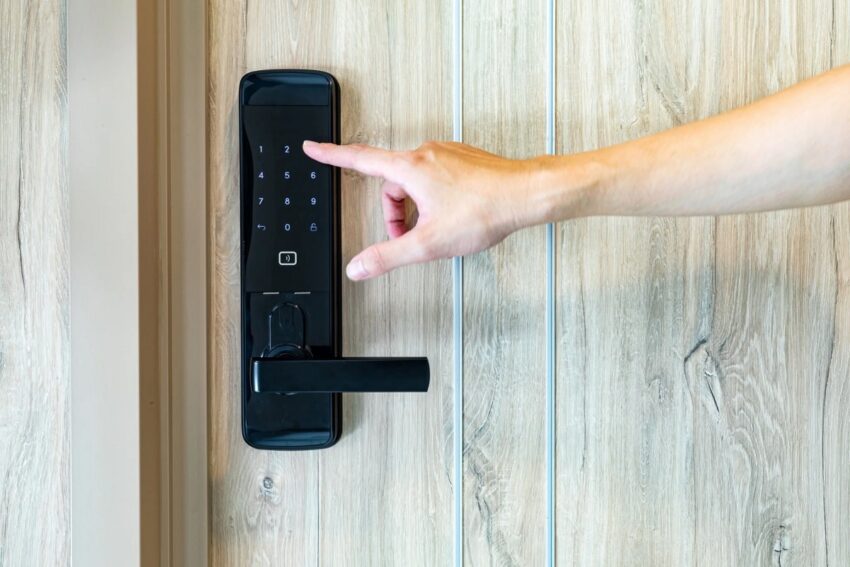Table of Contents
In this digital age, security is paramount. Traditional lock and key systems have served us well for centuries, but they come with their limitations. Enter digital locks, the cutting-edge solution that blends technology, convenience, and top-notch security. In this comprehensive guide, we will delve into the world of digital locks, exploring their features, benefits, and how they are revolutionizing the way we safeguard our homes and businesses.
In an era where technology touches every aspect of our lives, it’s no surprise that even our locks have gone digital. Digital locks, also known as electronic locks, have gained popularity for their ability to provide a higher level of security and convenience compared to traditional lock and key systems. This article will explore the various aspects of digital lock, from understanding their types and advantages to choosing, installing, and maintaining them.
What Are Digital Locks?
Digital locks are advanced security systems that replace the need for physical keys with electronic mechanisms. Instead of turning a key, users can gain access through methods such as entering a PIN code, using biometrics like fingerprints or facial recognition, or even via a smartphone app.
Types of Digital Locks
Electronic Keypad Locks
Electronic keypad locks require users to enter a pre-set PIN code to gain access. These locks are known for their simplicity and reliability. They are commonly used in residential and commercial settings.
Biometric Locks
Biometric locks use unique biological traits like fingerprints, retinal scans, or facial recognition to grant access. These locks provide a high level of security, as they are nearly impossible to replicate.
Bluetooth-Enabled Locks
Bluetooth-enabled locks allow users to connect their smartphones to the lock via Bluetooth technology. This allows for keyless entry, with the smartphone acting as the digital key.
Smart Locks
Smart locks take things a step further by integrating with home automation systems. They can be controlled remotely through a smartphone app, allowing users to grant access to others, even when they are not physically present.
Advantages of Digital Locks
Enhanced Security
Digital locks offer a higher level of security compared to traditional locks. Biometric locks, in particular, are extremely difficult to bypass, as they rely on unique biological data for access.
Convenience and Accessibility
With digital locks, you can forget about rummaging through your pockets for keys. Access is as easy as entering a PIN code or using your smartphone, making it a convenient option for busy individuals.
Keyless Entry
Say goodbye to the hassle of carrying physical keys. Digital locks offer keyless entry, reducing the risk of losing keys or having them stolen.
Integration with Smart Home Systems
Smart locks can seamlessly integrate with your home automation system. You can control your locks remotely, receive notifications of activity, and even integrate them with voice-activated assistants like Alexa or Google Home.
How Do Digital Locks Work?
Digital locks use a combination of electronic components, including sensors, microprocessors, and motors, to control access. When a valid access method is presented, such as the correct PIN code or a recognized fingerprint, the lock’s mechanism is activated, allowing the door to open.
Choosing the Right Digital Lock
Selecting the right digital lock for your needs is crucial. Consider the following factors:
Consider Your Needs
Think about where you plan to install the lock and who will be using it. Residential and commercial settings may have different requirements.
Installation and Compatibility
Check if the lock is compatible with your door and whether you need professional installation.
Brand and Quality
Choose reputable brands known for their quality and reliability.
Budget
Digital locks come in a range of price points. Determine your budget and look for options that fit within it.
Installing a Digital Lock
The installation of a digital lock can be a DIY project or done by a professional locksmith. Follow the manufacturer’s instructions carefully, and ensure the lock is securely installed.
Maintaining Your Digital Lock
Regular maintenance is essential to keep your digital lock functioning optimally. Clean the sensors, replace batteries, and update access codes as needed.
Key Takeaways
- Digital Locks Offer Enhanced Security: Digital locks, especially biometric ones, provide a higher level of security compared to traditional locks. They are extremely difficult to hack, making them an excellent choice for safeguarding your property.
- Convenience and Accessibility: Digital locks offer the convenience of keyless entry, eliminating the need to carry physical keys. Access is as simple as entering a PIN code or using your smartphone, making your daily routine more convenient.
- Integration with Smart Homes: Smart locks can seamlessly integrate with your home automation system. This means you can control your locks remotely, receive real-time notifications, and even incorporate them into voice-activated assistants like Alexa or Google Home.
- Choosing the Right Digital Lock Matters: When selecting a digital lock, consider your specific needs, installation requirements, brand reputation, and budget. Choosing the right lock ensures it aligns perfectly with your security goals.
- Regular Maintenance is Key: To keep your digital lock functioning optimally, follow regular maintenance routines. This includes cleaning sensors, updating access codes, and ensuring backup power sources are in working order. Regular maintenance is essential for long-term reliability.
Digital Lock Security Tips
To maximize the security of your digital lock, follow these tips:
Regularly Update Your PIN or Biometrics
Change your PIN code or update your biometric data periodically to minimize the risk of unauthorized access.
Keep Your Passcodes Secure
Ensure that your access codes are known only to trusted individuals and are not shared casually.
Monitor Access Logs
Many digital locks provide access logs. Review these logs periodically to track who has entered your property.
Backup Power Sources
In the event of a power outage, digital locks may rely on backup batteries. Ensure these batteries are functioning correctly.
Common Troubleshooting Tips
If you encounter issues with your digital lock, consult the manufacturer’s troubleshooting guide. Common problems include sensor calibration, connectivity issues, and battery replacement.
Is it possible for digital locks to be hacked?
Digital locks, especially biometric ones, are equipped with advanced security measures that significantly reduce the risk of hacking. These locks rely on unique biometric data or complex encryption methods, making unauthorized access a challenging feat. While they are highly secure, it’s important to acknowledge that no system is entirely invulnerable. To maximize security, opt for reputable brands known for their robust security features. Additionally, regularly update your security settings and firmware to stay ahead of potential vulnerabilities, ensuring that your digital lock remains a reliable and formidable barrier against unauthorized access.
What happens if I forget my access code?
Forgetting your access code can be a common concern, but it’s a manageable situation. First, consult the lock’s user manual, which often contains step-by-step instructions on how to reset or recover your access code. Manufacturers design their locks with user-friendly interfaces to assist in such scenarios. If you still face difficulties, consider reaching out to the lock’s manufacturer or contacting a professional locksmith. They possess the expertise to help you regain access without compromising security.
Are digital locks suitable for outdoor use?
Yes, some digital locks are specifically designed for outdoor use and are engineered to withstand various weather conditions. These locks are constructed with durable materials that can endure exposure to rain, extreme temperatures, and humidity. To ensure a digital lock is suitable for your outdoor needs, carefully review the lock’s specifications and product descriptions provided by the manufacturer. This will guarantee that you select a lock capable of maintaining its functionality and security in outdoor environments, making it a dependable choice for securing exterior doors.
Can I still use a traditional key with a digital lock?
Many digital locks offer the convenience of keyless entry, but they often come equipped with a physical key override as a backup method. This means that in situations where digital access methods may fail or during emergencies, you can still use a traditional key to unlock the door. However, it’s essential to understand that the primary advantage of digital locks lies in their keyless functionality, offering greater convenience and security. The traditional key is typically reserved as a contingency option, providing peace of mind for users who prefer a backup entry method.

